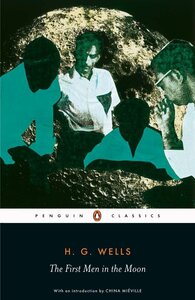You need to sign in or sign up before continuing.
Take a photo of a barcode or cover
adventurous
fast-paced
Plot or Character Driven:
A mix
Strong character development:
Complicated
Loveable characters:
Complicated
Diverse cast of characters:
Complicated
Flaws of characters a main focus:
Complicated
funny
mysterious
medium-paced
Loveable characters:
Yes
This was my 146th book finished in 2025.
This was a surprisingly enjoyable read. I found the characters very interesting and well-written. Definitely an improvement on Wells' earlier Sci-Fis that I've read.
I thought this was a good framing device, although I am slightly torn on whether I liked the last three chapters, or whether I would have wanted to "see" them in person.
I was a bit confused as to why the narrator suddenly started calling them "selenites" and "mooncalves" at the start of one chapter, and it seemingly came out of nowhere. But I later learnt what a mooncalf was, and that Jules Verne had coined selenite for a moon inhabitant. I haven't read that book which Wells based this on, but I have read two of Verne's books, and I wasn't impressed by them. I imagine Wells made a great improvement.
The narrator is an asshole and I love it. Confound it! Very funny. So perfectly played by Sacha Dhawan in the audiobook, wow! I heard The Master in him. Brilliant.
So yes, I do enjoy Wells' comedy, he's very good at it (having read some satirical pieces by him in the past).
I felt some similarities between the Selenite society and "Brave New World". Very interesting. I just wish we got more of this in the action, rather than a lot of repetition, and then later having it monologued to us.
One of the goodies, I'd say. Much more of a rounded story than, for example "The Time Machine".
This was a surprisingly enjoyable read. I found the characters very interesting and well-written. Definitely an improvement on Wells' earlier Sci-Fis that I've read.
I thought this was a good framing device, although I am slightly torn on whether I liked the last three chapters, or whether I would have wanted to "see" them in person.
I was a bit confused as to why the narrator suddenly started calling them "selenites" and "mooncalves" at the start of one chapter, and it seemingly came out of nowhere. But I later learnt what a mooncalf was, and that Jules Verne had coined selenite for a moon inhabitant. I haven't read that book which Wells based this on, but I have read two of Verne's books, and I wasn't impressed by them. I imagine Wells made a great improvement.
The narrator is an asshole and I love it. Confound it! Very funny. So perfectly played by Sacha Dhawan in the audiobook, wow! I heard The Master in him. Brilliant.
So yes, I do enjoy Wells' comedy, he's very good at it (having read some satirical pieces by him in the past).
I felt some similarities between the Selenite society and "Brave New World". Very interesting. I just wish we got more of this in the action, rather than a lot of repetition, and then later having it monologued to us.
One of the goodies, I'd say. Much more of a rounded story than, for example "The Time Machine".
adventurous
mysterious
reflective
tense
medium-paced
Plot or Character Driven:
Plot
Strong character development:
No
Loveable characters:
Complicated
Diverse cast of characters:
No
Flaws of characters a main focus:
Yes
adventurous
funny
medium-paced
Plot or Character Driven:
A mix
Strong character development:
No
Loveable characters:
No
Diverse cast of characters:
No
Flaws of characters a main focus:
Complicated
100 Years, 100 Books
"What good would the moon be to men? Even of their own planet what have they made but a battle-ground and theatre of infinite folly?"
A destitute, aspiring playwright encounters Cavor, a man by chance on the brink of a scientific discovery set to change the world as they know it. Bedford, our narrator, is self described as: “young, [his] affairs were in a mess, and [...] just the mood for reckless adventure—with a chance of something good at the end of it.” Sensing he could figuratively and literally strike gold with Cavor’s invention, the two end up journeying to the moon in a rash, domino-sequence of events. But it “was not like the beginning of a journey; it was like the beginning of a dream.” The binary duo discover the moon to be much more habitable than anticipated, its landscape lush with foreign flora and host to a native species of insect-humanoids, the Selenites. Their cross-species encounter goes awry when Bedford violently escapes their clutches, thinking they were being lead to their death. Cavor openly voices regret at never having the opportunity to interact and commune with their species. With a twinge of a prophetic farewell, the two men separate, in search of their lost apparatus to take them home. Only, Bedford finds their missing vehicle and escapes the moon, abandoning a Cavor he believes to be dead to this hostile sister-planet. Years later, Bedford receives a series of radio transmissions, transcribed to reveal they were sent by Cavor, who had survived injury and recapture by the Selentines. Over the duration of this period, Cavor and his captors mutually teach each other their languages and customs. The novel culminates in the meeting of Cavor and the Grand Lunar, the primary of his alien people. We learn the Selenites are nothing like the people of Earth; each individual is destined to serve a specific function in society, their body in service to said function. They have no libraries, books, or material culture - knowledge only exists as collective knowledge. They are a people enslaved to the physiological support of their minds. The Grand Lunar cannot understand man, so disparate to them, the “strange superficiality and unreasonableness of (man), who lives on the mere surface of a world, a creature of waves and winds, and all the chances of space, who cannot even unite to overcome the beasts that prey upon his kind, and yet who dares to invade another planet.”
This book starts as an eerily predictive, pioneering work of science fiction, and ends as an indictment of mankind with a similar throughline of prophecy. While the science underlying the progression of the narrative is not sound, it is nonetheless interesting to see a work of its age so thoroughly concerned with science and logic. This is owed to H.G. Wells tutoring in the subject. Additionally, the novel’s end, spelling man and his predilection to war and violence, is uncanny. Particularly in retrospect, knowing the world is but a mere half-century from the beginning of the Great War. One can only imagine the charges Wells could bring of mankind if he were to write this having comprehension of the weapons of mass destruction his fellow man would unleash on the world. I would recommend this to anyone who is fascinated in reading a work of science fiction written and published so early in the 20th century.
"What good would the moon be to men? Even of their own planet what have they made but a battle-ground and theatre of infinite folly?"
A destitute, aspiring playwright encounters Cavor, a man by chance on the brink of a scientific discovery set to change the world as they know it. Bedford, our narrator, is self described as: “young, [his] affairs were in a mess, and [...] just the mood for reckless adventure—with a chance of something good at the end of it.” Sensing he could figuratively and literally strike gold with Cavor’s invention, the two end up journeying to the moon in a rash, domino-sequence of events. But it “was not like the beginning of a journey; it was like the beginning of a dream.” The binary duo discover the moon to be much more habitable than anticipated, its landscape lush with foreign flora and host to a native species of insect-humanoids, the Selenites. Their cross-species encounter goes awry when Bedford violently escapes their clutches, thinking they were being lead to their death. Cavor openly voices regret at never having the opportunity to interact and commune with their species. With a twinge of a prophetic farewell, the two men separate, in search of their lost apparatus to take them home. Only, Bedford finds their missing vehicle and escapes the moon, abandoning a Cavor he believes to be dead to this hostile sister-planet. Years later, Bedford receives a series of radio transmissions, transcribed to reveal they were sent by Cavor, who had survived injury and recapture by the Selentines. Over the duration of this period, Cavor and his captors mutually teach each other their languages and customs. The novel culminates in the meeting of Cavor and the Grand Lunar, the primary of his alien people. We learn the Selenites are nothing like the people of Earth; each individual is destined to serve a specific function in society, their body in service to said function. They have no libraries, books, or material culture - knowledge only exists as collective knowledge. They are a people enslaved to the physiological support of their minds. The Grand Lunar cannot understand man, so disparate to them, the “strange superficiality and unreasonableness of (man), who lives on the mere surface of a world, a creature of waves and winds, and all the chances of space, who cannot even unite to overcome the beasts that prey upon his kind, and yet who dares to invade another planet.”
This book starts as an eerily predictive, pioneering work of science fiction, and ends as an indictment of mankind with a similar throughline of prophecy. While the science underlying the progression of the narrative is not sound, it is nonetheless interesting to see a work of its age so thoroughly concerned with science and logic. This is owed to H.G. Wells tutoring in the subject. Additionally, the novel’s end, spelling man and his predilection to war and violence, is uncanny. Particularly in retrospect, knowing the world is but a mere half-century from the beginning of the Great War. One can only imagine the charges Wells could bring of mankind if he were to write this having comprehension of the weapons of mass destruction his fellow man would unleash on the world. I would recommend this to anyone who is fascinated in reading a work of science fiction written and published so early in the 20th century.
Back when I read The War of the Worlds I had this dream that I was going to love every book by Wells. To be honest I'm in the cliché part with this author. Lets say I loved his most iconic works and got bored with his indie ones. I don't know what it was with The First Men in the Moon, it started very interesting I have no idea when it lost me. The first half was great but the second half, well, I have no idea. Anyway I can't go lower than 3 stars, the man was a visionary!
No es el estilo, ni la forma en que está escrito, ni el tema. No se que fue. Wells escribió todo con el mismo formato solo que usando ideas distintas y con cambios en el desarrollo, pero tiene una formula muy bien construida, una fórmula que me funciono de maravilla en La Máquina del Tiempo y La Guerra de los Mundos, por desgracia en esta nueva novela me perdió en algún momento a mitad de desarrollo.
Pero para ser honestos este hombre tenía una imaginación loquísima y unas ideas muy avanzadas. Sus descripciones son tan detalladas que sorprenden. Los primeros hombres en la Luna no es un libro tan dinámico como otras novelas del autor y hoy en día su mayor obstáculo seria que no puede competir con ellas ya que no encierra tanto misterio como antes. No podemos viajar en el tiempo y no sabemos a ciencia cierta si hay vida inteligente en otros planetas. Pero si tenemos información sobre la Luna, se sabe mucho mas de ella a cada día. Conforme pasas las paginas, la trama deja de ser ciencia ficción y se torna más en fantasía.
Aun así, la idea es buena y la primera mitad muy interesante. No deja de sorprenderme la ciencia ficción vieja, tiene algo de especial, una chispa que no se encuentra con facilidad en libros actuales.
No es el estilo, ni la forma en que está escrito, ni el tema. No se que fue. Wells escribió todo con el mismo formato solo que usando ideas distintas y con cambios en el desarrollo, pero tiene una formula muy bien construida, una fórmula que me funciono de maravilla en La Máquina del Tiempo y La Guerra de los Mundos, por desgracia en esta nueva novela me perdió en algún momento a mitad de desarrollo.
Pero para ser honestos este hombre tenía una imaginación loquísima y unas ideas muy avanzadas. Sus descripciones son tan detalladas que sorprenden. Los primeros hombres en la Luna no es un libro tan dinámico como otras novelas del autor y hoy en día su mayor obstáculo seria que no puede competir con ellas ya que no encierra tanto misterio como antes. No podemos viajar en el tiempo y no sabemos a ciencia cierta si hay vida inteligente en otros planetas. Pero si tenemos información sobre la Luna, se sabe mucho mas de ella a cada día. Conforme pasas las paginas, la trama deja de ser ciencia ficción y se torna más en fantasía.
Aun así, la idea es buena y la primera mitad muy interesante. No deja de sorprenderme la ciencia ficción vieja, tiene algo de especial, una chispa que no se encuentra con facilidad en libros actuales.
adventurous
funny
lighthearted
mysterious
reflective
fast-paced
Plot or Character Driven:
Plot
Strong character development:
No
Loveable characters:
Complicated
Diverse cast of characters:
No
Flaws of characters a main focus:
Yes
This is an incredibly ambitious story, even for someone with the creative mentality of H.G. Wells. The science in this fiction is highly imaginative, especially in 1901, when it was first published. It’s well thought out and great effort is taken to explain the technology. Like all of Wells’ books, at least those I’ve read, this contains a small cast of characters. But unlike other books, we aren’t offered much opportunity to get to know these characters. Instead, Wells focuses much more on invention and developing the moon’s habitat and the creatures living there.
A marvellous read, as always, but probably my least favourite so far.
A marvellous read, as always, but probably my least favourite so far.
Μπορεί να φταίει εκείνη η τραγική μετάφραση που έπεσε στα χέρια μου το καλοκαίρι του 1985, μπορεί να φταίει που συνέπεσε με το Χόμπιτ αναγνωστικά και οτιδήποτε άλλο επισκιάστηκε, μπορεί... ο,τιδήποτε, αλλά το βρήκα σχεδόν τραγικό και δε μάζεψα ποτέ το κουράγιο να το διαβάσω αμετάφραστο...
Δύο κύριοι της Βικτωριανής εποχής χάρη στον καρβονίτη, ένα μέταλλο ή κράμα με αντιβαρυτικές ιδιότητες επισκέπτονται το δορυφόρο της γης και συναντούν τους μυρμηγκόμορφους (;) κατοίκους του που έχουν όλως τυχαίως και μια κοινωνική δομή που παραπέμπει σε έντομα.
Χωρίς να φτάνει ποτέ το εύρος και το μεγαλείο του Η Μηχανή του Χρόνου, υποφέρεται αν σκεφτείς ότι γράφτηκε μια εποχή όπου δε γνωρίζαμε καν για άλλους γαλαξίες και η Ανδρομέδα θεωρείτο νεφέλωμα, ήταν στα πάνω της η θεωρία του "αιθέρα", οι νόμοι του Νεύτωνα δεν είχαν δεχτεί ακόμη τα φαλλοραπίσματα της θεωρίας της σχετικότητας και τα περί καμπύλωσης του χωροχρόνου, ενώ ο Πλούτωνας δεν είχε καν ανακαλυφθεί (για να βιώσει αργότερα την πίκρα της υποβάθμισης σε πλανήτη-νάνο, περίμενω έναν πολιτικώς ορθό αστρονόμο να τοποθετηθεί επ' αυτού του χαρακτηρισμού). Κι αν φώναζες σε επιστημονικό συνέδριο "ΚΟΥΑΡΚ" σε πετούσαν έξω γιατί νόμιζαν ότι έχεις τρελαθεί ή κάνεις την πάπια.
Η περιπέτεια δε συναρπάζει ακριβώς, ούτε και οι χαρακτήρες καθίστανται ιδιαίτερα αξιομνημόνευτοι. Αν πάντως διαβάσω το πρωτότυπο και αλλάξω γνώμη, θα ανακαλέσω δημόσια, για εσάς τους 1,5-2 που διαβάζετε αυτές τις κριτικές.
Δύο κύριοι της Βικτωριανής εποχής χάρη στον καρβονίτη, ένα μέταλλο ή κράμα με αντιβαρυτικές ιδιότητες επισκέπτονται το δορυφόρο της γης και συναντούν τους μυρμηγκόμορφους (;) κατοίκους του που έχουν όλως τυχαίως και μια κοινωνική δομή που παραπέμπει σε έντομα.
Χωρίς να φτάνει ποτέ το εύρος και το μεγαλείο του Η Μηχανή του Χρόνου, υποφέρεται αν σκεφτείς ότι γράφτηκε μια εποχή όπου δε γνωρίζαμε καν για άλλους γαλαξίες και η Ανδρομέδα θεωρείτο νεφέλωμα, ήταν στα πάνω της η θεωρία του "αιθέρα", οι νόμοι του Νεύτωνα δεν είχαν δεχτεί ακόμη τα φαλλοραπίσματα της θεωρίας της σχετικότητας και τα περί καμπύλωσης του χωροχρόνου, ενώ ο Πλούτωνας δεν είχε καν ανακαλυφθεί (για να βιώσει αργότερα την πίκρα της υποβάθμισης σε πλανήτη-νάνο, περίμενω έναν πολιτικώς ορθό αστρονόμο να τοποθετηθεί επ' αυτού του χαρακτηρισμού). Κι αν φώναζες σε επιστημονικό συνέδριο "ΚΟΥΑΡΚ" σε πετούσαν έξω γιατί νόμιζαν ότι έχεις τρελαθεί ή κάνεις την πάπια.
Η περιπέτεια δε συναρπάζει ακριβώς, ούτε και οι χαρακτήρες καθίστανται ιδιαίτερα αξιομνημόνευτοι. Αν πάντως διαβάσω το πρωτότυπο και αλλάξω γνώμη, θα ανακαλέσω δημόσια, για εσάς τους 1,5-2 που διαβάζετε αυτές τις κριτικές.
Wells' description of first contact between humans and the residents of the moon reads more like social commentary than straight sci-fi. But it's still quite readable as a straight bit of sci-fi.








